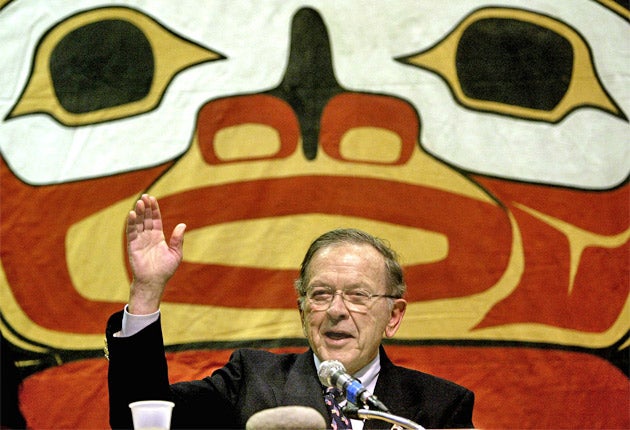Ted Stevens: Long-serving senator who secured billions of dollars for the state of Alaska

Your support helps us to tell the story
From reproductive rights to climate change to Big Tech, The Independent is on the ground when the story is developing. Whether it's investigating the financials of Elon Musk's pro-Trump PAC or producing our latest documentary, 'The A Word', which shines a light on the American women fighting for reproductive rights, we know how important it is to parse out the facts from the messaging.
At such a critical moment in US history, we need reporters on the ground. Your donation allows us to keep sending journalists to speak to both sides of the story.
The Independent is trusted by Americans across the entire political spectrum. And unlike many other quality news outlets, we choose not to lock Americans out of our reporting and analysis with paywalls. We believe quality journalism should be available to everyone, paid for by those who can afford it.
Your support makes all the difference.Contrary to impressions that may have arisen since 2008, the politician who put Alaska on the map was not a certain Sarah Palin. That distinction unequivocally belonged to Ted Stevens – "Uncle Ted" to many Alaskans who could barely remember a time when he was not representing America's largest state in the US Senate, securing billions of federal dollars for its development.
Stevens was appointed to his office in 1968, just nine years after Alaska won statehood. Six times re-elected in his own right, he spent 40 years in the Senate, more than any Republican in history. South Carolina's Strom Thurmond served for longer, but for the first decade Thurmond was a Democrat.
A Midwesterner by birth and a Californian by education, Stevens served in the Army Air Corps in the Second World War, flying the "Hump" route over the Himalayas taking supplies from India to China. After graduating from Harvard Law School he moved to Alaska in 1950 to work as an attorney in Fairbanks. He would devote the rest of his life to the state, first in Washington at the Interior Department, working on Alaska's impending statehood, then back in Alaska, and finally in the Senate, where he became one of the great barons of Capitol Hill.
For over six years Stevens chaired the powerful Appropriations Committee and for a further two the Commerce Committee, stepping down only in January 2007 when Democrats recaptured the Senate. Over the years, according to one estimate, he channelled $3.4bn to his home state in 1,452 federally funded projects, an all-time record.
He was unapologetic: vast, under-developed and strategically vital Alaska, he maintained, needed all the help it could get. But critics accused him of abusing the system – never more so than in the case of the "Bridge to Nowhere", a $400m project that would have linked the Alaska mainland with an island with 50 inhabitants. Such was the outrage and mockery that Congress (and Alaska) were shamed into dropping the scheme, in 2005.
By then though Stevens was long established as one of Congress's supreme exponents of the pork barrel. Fittingly perhaps, he died just six weeks after his one rival in the field – Robert Byrd, the West Virginia Democrat who became the longest serving Senator in history. Indeed, Byrd both preceded and succeeded Stevens as president pro tempore of the Senate, its top-ranking member who according to the US constitution is third in line of succession to the Presidency.
Negotiating skills and a mastery of Senate procedures were not Stevens' only weapons. He had a short fuse and a reputation for never forgetting a slight. "I never lose my temper, I always know where I've put it," he once said. Indeed, the man who publicly described himself as "a mean miserable SOB," came top in a 2006 poll by a Washington magazine of politicians with the hottest tempers on Capitol Hill.
His powers were not limitless. Though he did much to boost the development of Alaska's oil industry, Stevens repeatedly failed to open up the state's Arctic National Wildlife Refuge to drilling, and in 1980 could not stop the Alaska Lands Act, setting aside vast swathes of the state as a federally protected wilderness.
Perhaps as a result, he had little time for "extreme environmentalists," many of whom he said were "hired people" and "hucksters selling slick-backed magazines and national memberships." But the gratitude of his own state was never in doubt. In 2000 he was named Alaskan of the Century by the state legislature, "Alaska's finest contribution to our national leadership."
But that leadership ended in near-disgrace in October 2008 when a federal court convicted him on seven felony counts for concealing $250,000 in gifts, mostly in the form of renovation work on his home. At the time Stevens, then 84, was seeking re-election for a seventh time. But in the vote a few days later he narrowly lost to his Democrat challenger, Mark Begich. In April 2009 the conviction was overturned on the grounds of prosecutorial misconduct. But the restoration of Stevens' reputation was too late to restore his political career.
Rupert Cornwell
Theodore Fulton Stevens, politician: born Indianapolis 18 November 1923; US Senator for Alaska 1968-2009; President pro-tempore US Senate 2003-07; married firstly Mary Cherrington (deceased; three sons two daughters), secondly Catherine Chandler (one daughter); died Aleknagik, Alaska 9 August 2010.
Join our commenting forum
Join thought-provoking conversations, follow other Independent readers and see their replies
Comments